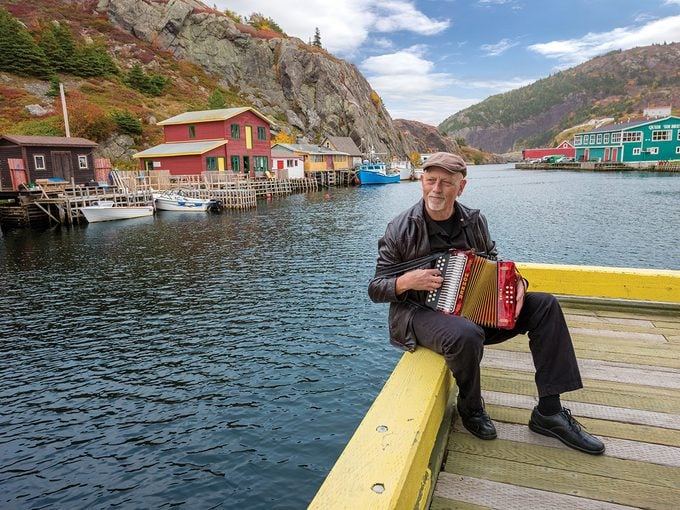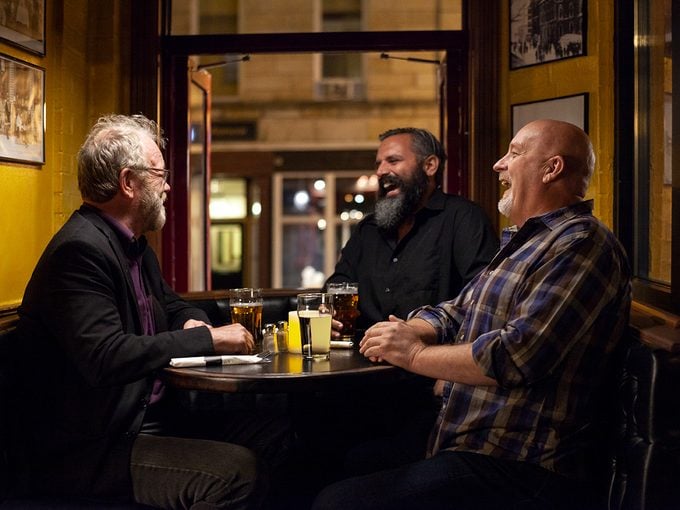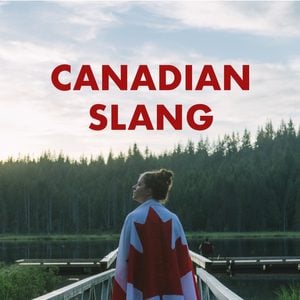Common Newfoundland Sayings, Decoded

Newfoundlanders have developed their own unique dialect, including certain turns of phrase that first-time visitors will likely find a little baffling. Here’s what I wish I’d known about the local language (and the history behind it) before heading out on a two-month tour of the Rock.
As a travel writer on a months’-long assignment in Newfoundland and Labrador, I’m learning new things every day. My search for good stories, great characters and rich experiences has me touring all over, from remote Labrador communities accessible only by boat, to warm, welcoming villages with a distinctly Irish feel on the Great Northern Peninsula.
My destination today is a small outport community called Leading Tickles, just across Badger Bay from the picturesque fishing village of Triton. Riding in an open boat with Mike Roberts, a lifelong cod, lobster, crab and squid fisherman, he’s assembled a group of friends and relatives to join us on the excursion. The skies are bright, the seas are calm, the air is salty… And I have very little idea what’s going on.
As an Ontarian with the blandest accent you can imagine, the rapid chatter and quick turns of phrase on board this boat fascinate me. I’m happy to sit in the bow and watch the waves as these friends chit-chat amongst themselves in the stern, pointing to things on the shore and engaging in animated conversation. One of them cracks a joke, and everyone explodes in laughter. I just smile along.
Catching a word or two here and there, for the most part, it might as well be Russian. Roberts, showing a warmth and kindness that’s common across Newfoundland and Labrador, quickly comes over and loops me in, recounting the essence of the joke, and pointing out landmarks along the shore. It’s just one moment among many where I marvel at the linguistic texture that’s developed here over hundreds of years.

The origins of Newfoundland’s distinct language
Newfoundland and Labrador can be confusing for first-time visitors, in all the best ways. It’s a province that’s got a long and fascinating history, and a diversity of dialects to match. “People always talk about a Newfoundland accent, but there’s no such thing,” says Dale Jarvis, a St. John’s-based folklorist, self-professed “word nerd,” and executive director of Heritage Newfoundland. “There’s actually a whole pile of Newfoundland accents.”
Jarvis explains that permanent settlement in this part of Canada dates back to the 1500s. Those early arrivals from the west of England and southern Ireland brought with them accents and vernacular that were already well-established. Over time, it was modified by Innu and Inuit influences, as well as French, especially in places like the Port au Port Peninsula on the west coast of Newfoundland.
The isolated nature of the region’s small “outport” fishing communities—many accessible only by water—made them time capsules, preserving the original language and accents, even while they evolved differently elsewhere. In the southern reaches of the Avalon Peninsula, south of St. John’s, and villages like Tilting on Fogo Island, the accent tends to be Irish, with Gaelic words thrown into the mix. In Port au Port, people often speak with a French accent, even if they don’t speak French. And Jarvis notes that in areas originally settled by West Englanders, remnants of Shakespearean English remain. “People there still say things like ‘two of ye,’” he notes. “When you hear the original pronunciation, Shakespeare sounds a lot like Newfoundland.”
People here developed a sort of verbal shorthand, a quick and easy way to communicate with one another—that rapid-fire patois that often baffles visitors. But Jarvis notes that Newfoundland has long been a hub of transportation, by sea and air, and that Newfoundlanders are very adept at switching over to standard English when communicating with those who have “come from away” (more on that later). It’s a gift of the gab that seems to be second-nature when you look at the region’s rich history of storytelling, singing ballads, and more recently, stand up comedians. (Many of the country’s top comedians hail from here.) “Quickness and facility with the language, that marks Newfoundland,” Jarvis says.

Common Newfoundland sayings, decoded
Some words and phrases are often very specific to a certain place, for example the term “slue,” which around Gander can mean hello or goodbye. Added to that, many phrases are derived from this province’s inextricable link with seafaring culture. Boat captain Barry Rogers who spends his time in Twillingate and St. John’s, gives one example. “If I went down to the boat in the morning and the lads are lying around, I’d say, ‘What are you, draw-latching?!’” Commonly used around Twillingate, the term refers to the wooden latch on a fishing stage (often drawn open with rope or twine), and roughly translates as “loafing.”
Moving across the province, I’ve heard certain terms again and again, compiling a small list along the way. Local friends were happy to weigh in, adding their favourite expressions. Altogether, it formed a handy little lexicon to help navigate the local linguistic tides. Here’s just a small primer to get you started, for when you visit:
Come from away: Sometimes shortened to just “CFA,” this phrase, used as the title of a Tony-award winning Broadway musical, applies to anyone not from Newfoundland and Labrador. (If you’re a visitor, that’s you.) For example: “Are you come from away?” or “You know Tony? He’s from away.”
B’y: A contraction of “boy.”
Yes b’y: Generally a term of agreement, but very versatile. It can express a wide variety of things, from sarcasm to frustration to astonishment, even disagreement.
Deadly: Really good, almost to the point of being dangerously good. As in, “Have some of these cheezies—they’re deadly.”
What y’at: A contraction of “What are you at,” it’s a form of greeting, the equivalent of asking, “How’s it going?” There are only two standard replies: “Nothin’” and “This is it!”
Adding “some” before a word: Emphasizes and underlines the word that follows. For example: “That storm last night? It was some awful.”
Buddy: A general term for a random dude. Example (if telling a story): “So, buddy was out there in his boat…”
Buddy Wasisname: Useful when you can’t remember someone’s name. For example, “Remember buddy wasisname? He was in that movie…”
Best kind: Very good, often referring to people. For example: “You know Mary? She’s best kind.”
And, if you’re feeling a little confused—just ask. Most Newfoundlanders will be more than happy to provide an explanation of anything you don’t understand, often accompanied by a colourful story. Because everyone here is best kind.
Now that you’ve got these Newfoundland sayings under your belt, read the heartwarming story that will convince you that Newfoundland is the kindest province.






